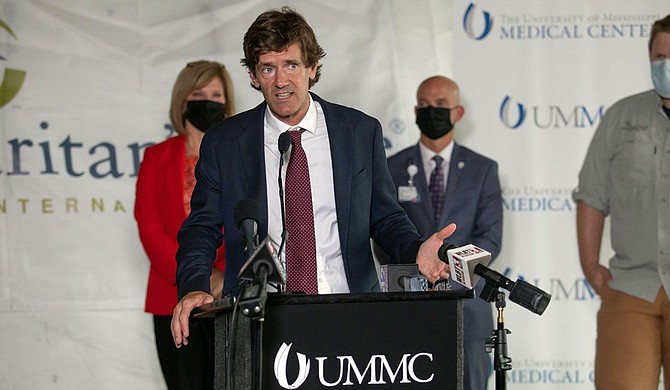Mississippi State Health Officer Dr. Thomas Dobbs warned Mississippians against taking feed store ivermectin for COVID-19, telling people they should talk to their physician for any treatment plan. Photo by Melanie Thortis/UMMC Photography
At least one individual has been hospitalized in Mississippi after ingesting a drug intended for treating worms in livestock, the Mississippi State Department of Health revealed today. The medicine, ivermectin, is not approved for treating COVID-19.
“There are potential toxicities. So it’s something, you know, as you know, I think some people are trying to use it as a preventative, which I think is really kind of crazy. So please don’t do that,” Mississippi State Health Officer Dr. Thomas Dobbs said during a discussion on Zoom today.
MSDH later confirmed to Mississippi Free Press reporter Nick Judin that the person was hospitalized in the state for ivermectin toxicity, but it is not clear whether or not the new patient was a resident. MSDH did not reveal when the incident happened or the patient’s current condition.
Despite a lack of scientific evidence that ivermectin is effective at treating COVID-19, it has become a popular go-to drug in some circles, especially among opponents of COVID-19 vaccines and public-health measures like masking. It’s a similar phenomenon to the push last year for COVID-19 patients to take hydroxychloroquine despite studies finding it ineffective against the virus.
“You know, for the life of me, I don’t get it. Dr. Dobbs, you have a vaccine that’s safe and effective. And yet people, as opposed to getting the vaccine, want to go after these kinds of things,” MSDH Communications Director Liz Sharlot said during today’s Zoom discussion. “What’s your thought process on that?”
Dr. Dobbs urged Mississippians to talk to their doctors.
“You know, please work with your doctor. This is medical treatment. You wouldn’t get your chemotherapy at a feed store,” the state health officer said. “I mean, you wouldn’t want to treat your pneumonia with your animal’s medication. It can be dangerous to get the wrong doses of medication, especially for something that’s meant for a horse or a cow. So we understand the environment we live in. But it’s really important if people have medical needs to go through your physician or provider.”
Though the U.S. Food and Drug Administration has approved ivermectin to treat people with conditions caused by parasitic worms and external parasites like head lice, the FDA warns that the forms of ivermectin used to treat animals are not the same product.
“For one thing, animal drugs are often highly concentrated because they are used for large animals like horses and cows, which can weigh a lot more than we do—a ton or more,” the FDA wrote in a March 2021 notice. “Such high doses can be toxic in humans.”
But taking human-approved doses of ivermectin for “unapproved use” and without proper medical oversight “can be very dangerous,” the agency warned.
“There’s a lot of misinformation around, and you may have heard that it’s OK to take large doses of ivermectin. That is wrong,” the FDA said. “Even the levels of ivermectin for approved uses can interact with other medications, like blood-thinners. You can also overdose on ivermectin, which can cause nausea, vomiting, diarrhea, hypotension (low blood pressure), allergic reactions (itching and hives), dizziness, ataxia (problems with balance), seizures, coma and even death.”
Aside from getting the COVID-19 vaccine to prevent infection or severe illness, MSDH has urged Mississippians who do test positive to immediately speak with their health-care providers about getting monoclonal antibody antibody infusion treatments. Studies have found that the infusions can prevent as many as 70% of mild cases of COVID-19 from escalating into severe illnesses that result in death or require hospitalization.
State Reporter Nick Judin contributed to this report.
Watch, listen or read/search full transcript of State Health Officer Dr. Thomas Dobbs explaining on MFP Live how the delta variant spreads, its dangers and specific safety precautions from school assemblies, to flying, to masking.
This story originally appeared in the Mississippi Free Press. The Mississippi Free Press is a statewide nonprofit news outlet that provides most of its stories free to other media outlets to republish. Write shaye@mississippifreepress.org for information.
More like this story
- MSDH Implores Use of Oral COVID-19 Antiviral Pills amid Monoclonal Antibody Shortage
- 10th Child Dies as Mississippi Encounters Likely Omicron Peak, Hospitals Still Over Capacity
- Pfizer Booster Shot Available For Those 65 and Older
- MSDH Encourages Older, Immunocompromised Mississippians To Get Boosted
- COVID-19 Tests, Monoclonal Treatments in Short Supply amid Case Surge



Comments
Use the comment form below to begin a discussion about this content.